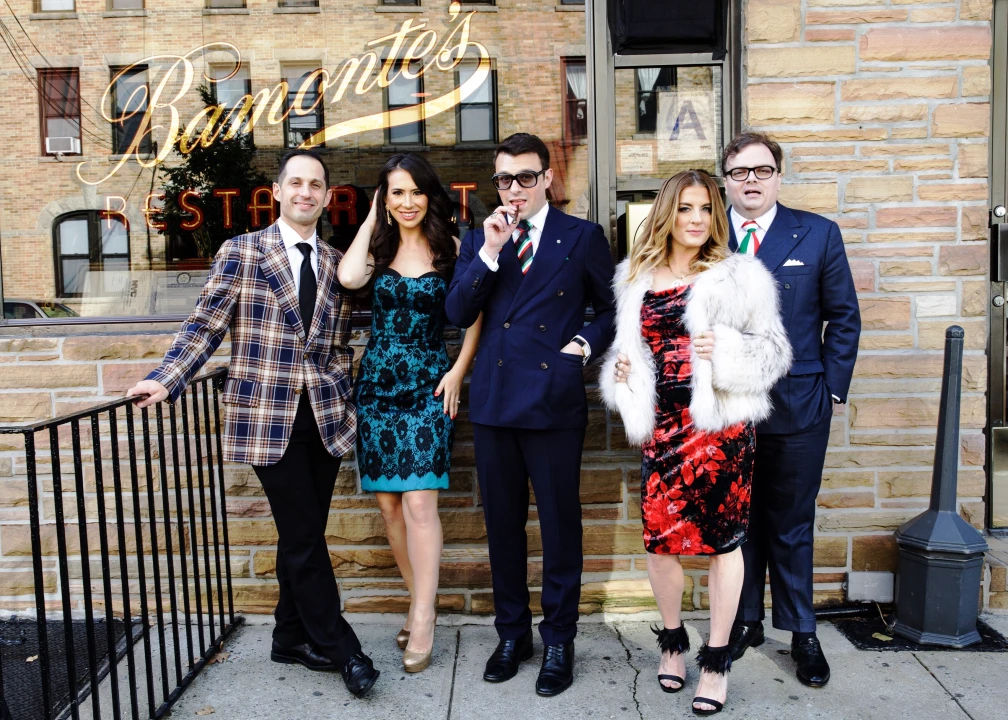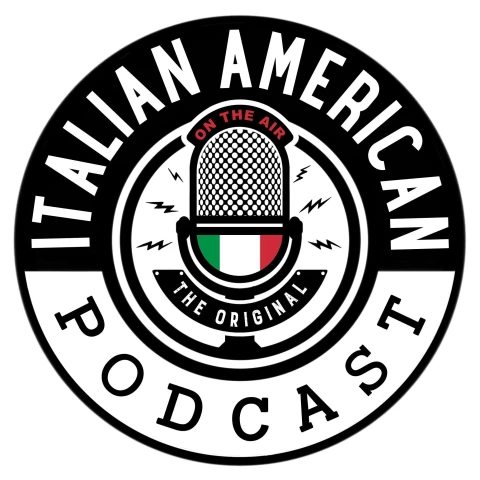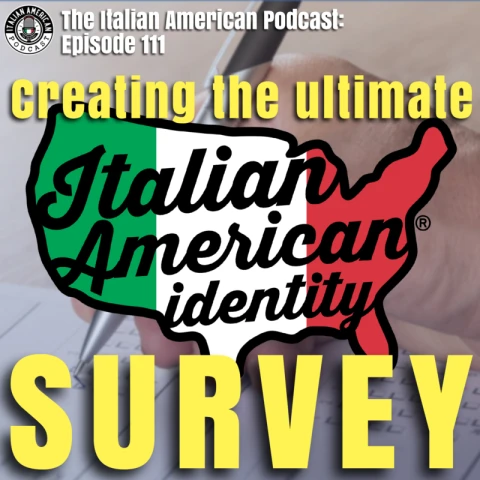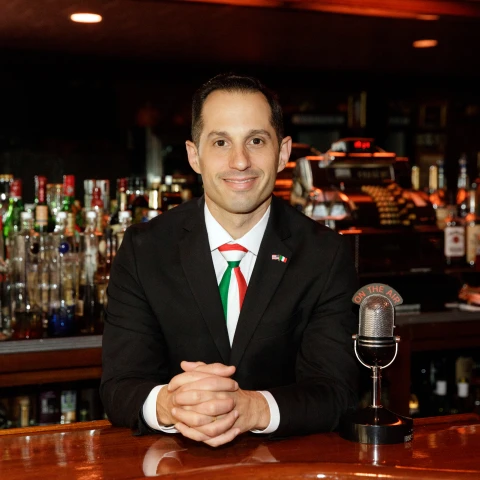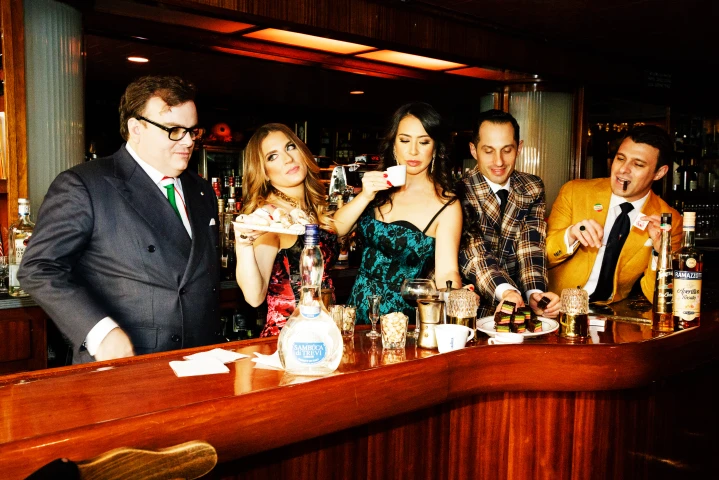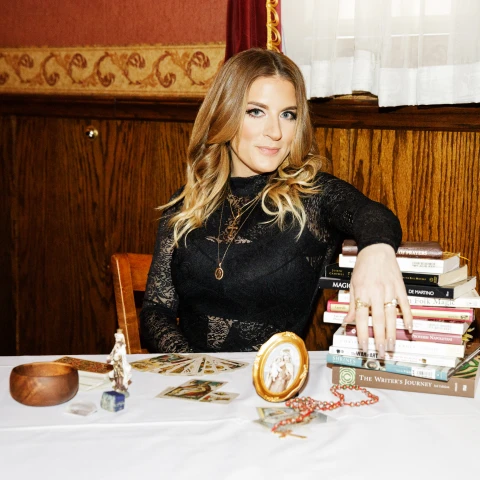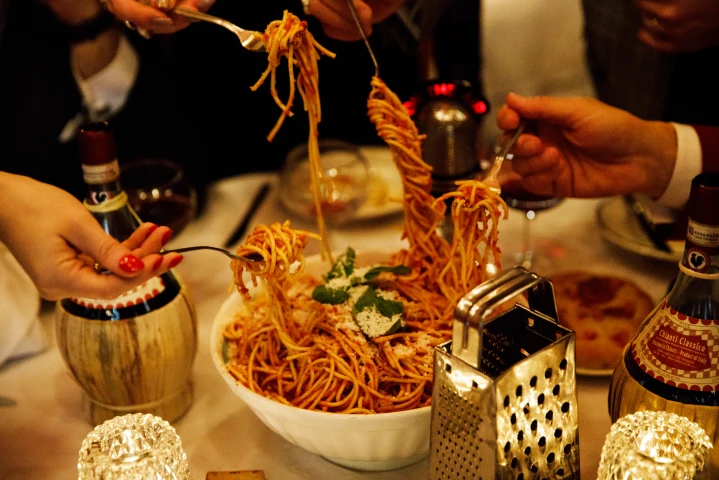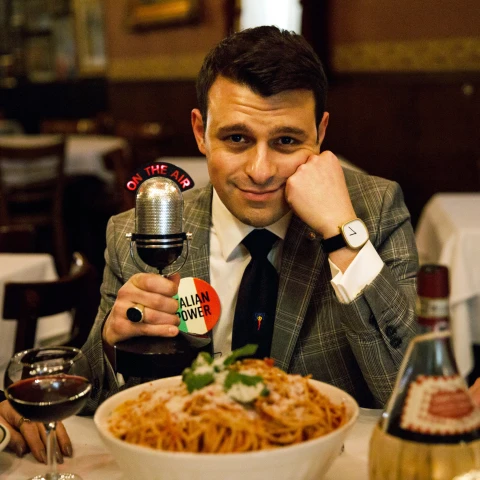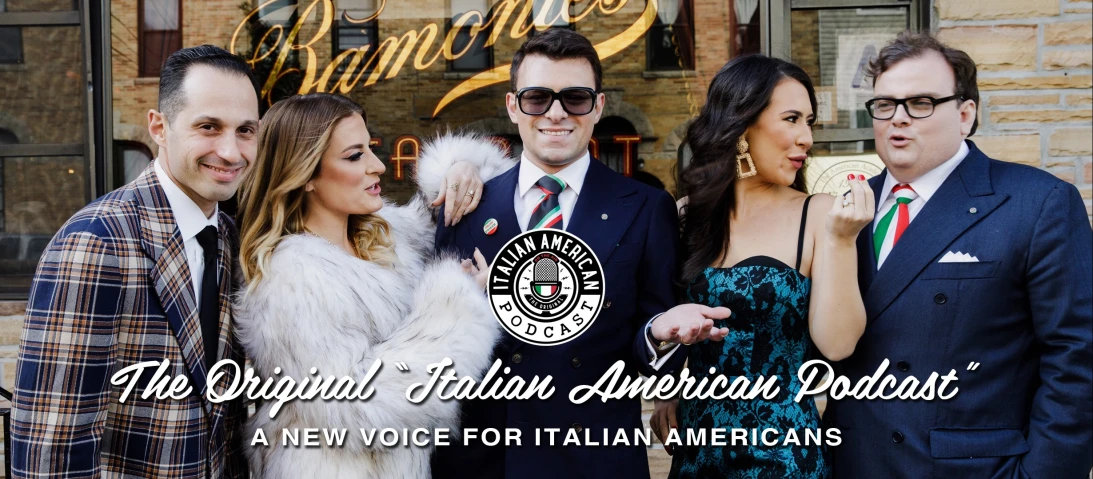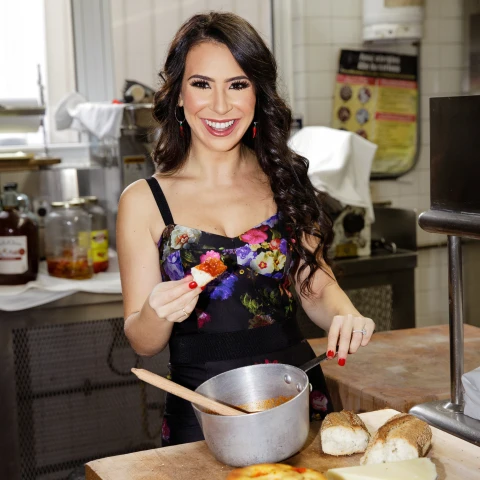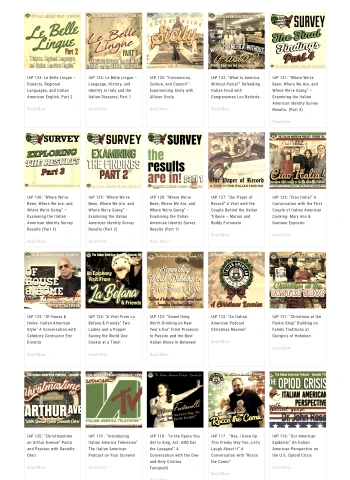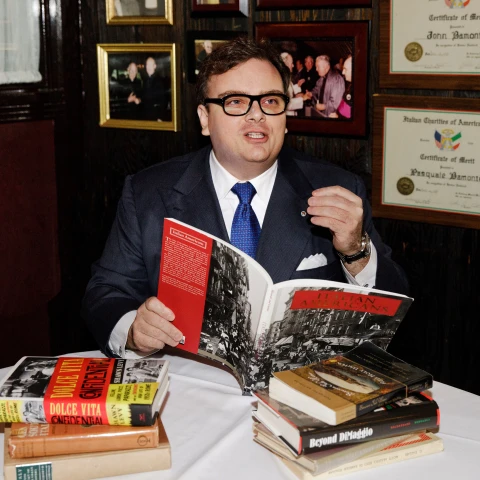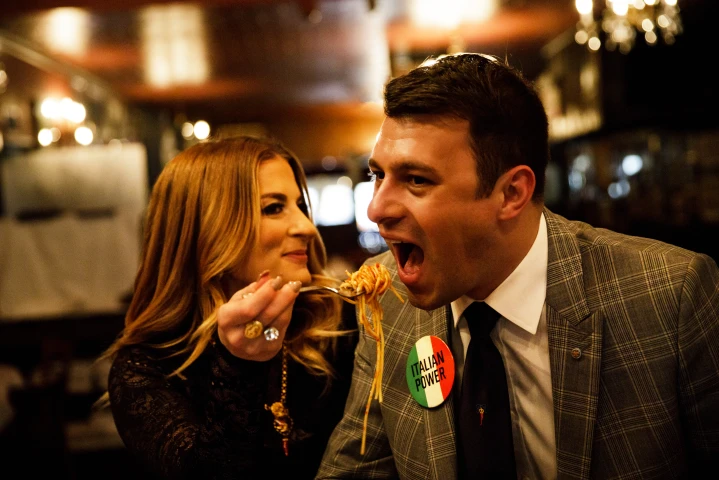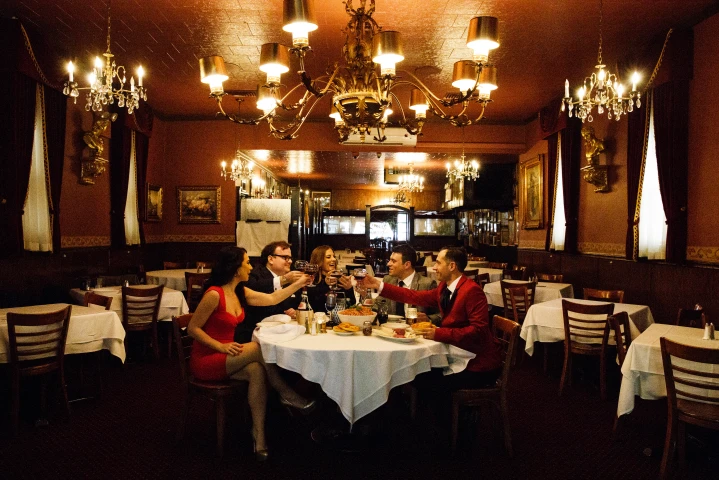The podcast is more and more now an effective, new, fun communication tool. You can listen to it on any device, and in the world of Italian Americans there are now many different ones. Even We the Italians started his, first in video and then also in audio. The first podcast of the Italian-American world was born a few years ago. I was lucky enough to meet Dolores and Anthony at a NIAF gala, and I immediately understood that they were two dynamic and intelligent people: we became friends.
Confirming that I wasn't wrong about them, their podcast has grown, it's structured. And it became that of a team of young and talented protagonists. I confess I've been a devoted fan of Italian American Podcast from the beginning. I find it wonderful the atmosphere that the guys have been able to create: you joke about it, but you give space to many real and important topics. It's an initiative that I love very much, which is why I'm happy to host the entire cast of the IAP here on We the Italians. A special thanks goes to them, and to my friend Stephanie Longo who was instrumental in the success of the interview. Thanks guys: stay safe, and long live the Italian American Podcast!
How and when was the Italian American Podcast born?
Anthony Fasano and Dolores Alfieri Taranto created The Italian American Podcast in 2015, and it has since become the first and most engaging podcast dedicated to helping Italian Americans learn about and celebrate their brilliant heritage.
The vision was simple—to chronicle the traditions and stories of the heritage they both cared so deeply about.
With that shared passion at its foundation, what began as a friendly project quickly grew into something greater, and with each new episode the audience grew. Italian Americans were hungry for the honest and thoughtful conversations that became the show’s calling card.
Like every good Italian family, the podcast team began to grow in 2018, when “The Italian American Power Hour” was born, complete with a cast of characters that round out the family-dinner-table feel.
John M. Viola, Rossella Rago, and Patrick O’Boyle were joined by Dolores and Anthony in exploring an all-new style of show—unfiltered, raucous, round-table conversations digging deep into the “hows and whys” of who we are-- a communal therapist couch for the Italian American psyche!
The audience loved the new format as a complement to Anthony and Dolores’s one-on-one journalistic style of episodes. What started out as two sides of the same coin quickly began to mature into a new phase in the young history of The Italian American Podcast.
Now, the original Italian American Podcast is heading into the future with an enlarged team, a new style, and an ever-deepening commitment to bringing the heart of the Italian American experience to the 25 million Americans of Italian descent who are lucky enough to have been born Italian.
In my numerous interviews, I have verified how all adult Italian Americans are concerned to ensure that their children and grandchildren continue their activities proudly in defense of Italian culture and heritage. You five are all young: do you have a strategy to involve Italian American other girls and boys? How can we help you?
John: One of the things we found so wonderful about this platform is how much it can be enjoyed both by individuals of all ages and by families together. We've been blown away by the responses from people who wait to listen with their grandparents or parents. As a matter of fact, last week, we had a woman tell us that her nine-year-old daughter shared that ours was her favorite podcast because we all talked over one another just like her family did. For us, that’s a real badge of honor. Podcasting is a medium that's intrinsically blind to age. It's a phenomenal way to reach all kinds of people. We think our content and the kinds of projects that we work on, which we try to make both educational and entertaining, appeals to all age groups. You, our friends at We The Italians, have done a wonderful job of spreading our story, not only among our own community, but also in Italy. You’re already helping us more than you know, you’re introducing the world to the incredible successes and interesting stories of who our community is.
You are on the East Coast: do you have plans to “conquer” the rest of the United States too?
John: If by “conquer,” you mean eat and laugh our way through the Italian communities west of the eastern seaboard, then consider us Attila the Hun! We're more than excited to take ourselves out of our hometowns and the uniquely tri-state Italian American experience that we grew up with. If you watch our new YouTube series, “Greetings from Italian America,” you'll see that we've begun to make our way, little by little, outside with visits to places like New Orleans, Louisiana, and New Haven, Connecticut. Obviously, none of us could have predicted where the world would be in terms of the limitations on travel today, but we had scheduled multiple road trips across the country to Italian American communities, both large and small, in order to not only engage guests for the Podcast, but create content for our YouTube channel as well. We're really hopeful that as this crisis abates, we'll be able to get right back on track and find every community from New York’s millions and millions of Italian Americans to the 100% Italian town of 15 residents in Shoup, Idaho, which we mentioned in a recent Podcast episode.
Your content is always very interesting: I was particularly impressed by your survey. Can you tell me what it is about and what are the most important results?
John: For those interested in our 2020 Italian American Identity Survey, I highly recommend they go back and listen to our four-part series in which we digest and discuss the results. The survey was really born out of a project that has been brewing in my mind since my days at NIAF. I always felt that we talked about the Italian American community as a monolithic entity when, in reality, it's made up of people from all parts of Italy, living in all parts of the United States, transcending all types of demographic strata. I've always wanted to do what we could to see where the similarities in our experience were, and find what were the staples that defined Italian Americans of all types.
The best thing about the survey was that with very little outreach we received more than 1,600 responses. Even though we made the survey about double the length that the survey builder recommended, almost everyone still completed the entire thing. We were thrilled to see how many people still gather as a family on Sundays and share a meal together, or the number of people who have gone out and decided to reclaim the Italian language or their original languages. Every answer was of incredible value and helped us to better understand the community that we claim to serve. Here are the links to the four survey episodes: the number 1; the number 2; the number 3; the number 4.
Dolores and Anthony, you're the "parents" of the podcast, the ones who started it. It is a great merit, and so is the extension of the successful initiative to others. Often, unfortunately, in Italian communities, there are jealousies that are probably a bit typical of our Italian DNA. Please describe our readers the advantage of having opened your creature to other successful and talented friends like you.
Dolores and Anthony: We had a lot of fun growing The Italian American Podcast. What started out as an innocent, simple way to record some of our own family traditions turned into a myriad of amazing conversations, countless inspirational emails from listeners, and relationships with listeners who now live in an online group we call The New Neighborhood - A Place for Italian Americans. However, what many people don't see is all of the work behind the scenes that it takes to coordinate, record, produce and deliver a podcast of this nature. As the show grew, it became impossible for both of us to balance the show with our 9 to 5 jobs and our families, and so we made a conscious decision to seek help. John, Rossella and Pat were easy choices for us to reach out to as they are all friends and all very active in the Italian American Community and have built their own audiences and fans through the work they have done. There is a great philosophy that it is better to have a small part of something big, than all of something small, so we couldn't have been more thrilled to share the podcast experience with friends, and the decision has proven to be one of the best we've made. The more Italian Americans we can inspire, the better!
John, you're certainly a leader and an innovator. You’ve been the youngest President of NIAF, now you’re a member of this wonderful podcast, and you also started a new venture in which you and Rossella produce videos with "Greetings From Italian America". What do you see in your future, in that of the Italian American Podcast and in that of the Italian American community?
John: What can I say? As much as I tried to find a real job, I always come back to being a professional Italian American in the end. I think that the future of the podcasts and the future of the community are tied in an unbreakable bond. We always hope that the Podcast, despite our regional limitations, is one that engages Italian Americans everywhere and of all types with respect, curiosity, and passion. I believe that as the Italian American community continues to evolve away from representing a monolithic bloc, that it’s the individuals and their unique versions of our Italian American heritage that we need to speak to and understand. The community is moving away from life in enclave neighborhoods and regular social gatherings, but it will continue to grow and thrive in the digital world. We hope that we can evolve forward with the best of what we are in the new media and for a new generation.
Rossella, to me, you're the master of Italian cuisine: “Cooking with Nonna” is a huge success. But you are also the living example that Italian cuisine allows you to stay in great shape. Can you tell our Italian American readers a secret of yours?
Rossella: I’m afraid there is no great secret. Only great shape wear.
I really just try to listen to my body and live my life with balance. When it’s time to feast, I feast. When it’s time to slow down, I take some time off from pasta and focaccia. I believe it’s impossible to be a truly sensual woman and not enjoy food. In the end, I think Sophia Loren said it best. “I’d rather eat pasta and drink wine than be a size zero.”
Patrick, I've been dealing with the Italian American culture for years, I'm really fascinated by people like you who have a great knowledge of a subject that is to me very dear and important. What is the most curious and original aspect of your experience as a connoisseur of the Italian American world? Something very few people know about…
Patrick: The thing I find most fascinating is that there are very old communities of Italian Americans that someone from the New York metropolitan area would never have realized that they exist, places like Kansas, West Virginia, Nebraska, Colorado, etc. These communities are trapped in amber, in the very best sense. They’ve maintained a unique amalgamated culture that’s reflective of the periods when and the places from which their immigration originated. The absolute biggest weakness of the Italian American communities in the major cities of the American East Coast is our collective ignorance of these communities. They have yet to receive their due.
Il podcast è sempre più ormai uno strumento di comunicazione efficace, nuovo, divertente. Lo si può ascoltare su qualsiasi device, e nel mondo degli italoamericani ce ne sono ormai diversi. Persino We the Italians ha iniziato il suo, prima in video e poi anche in audio. Il primo podcast del mondo italoamericano nacque qualche anno fa. Ebbi la fortuna di incontrare Dolores e Anthony ad un gala della NIAF, e capii subito che erano due persone dinamiche e intelligenti: diventammo amici.
A conferma che non mi ero sbagliato su di loro, il loro podcast è cresciuto, si è strutturato. Ed è diventato quello di una squadra di giovani e bravissimi protagonisti. Confesso di essere un devoto fan dell'Italian American Podcast, sin dall'inizio. Trovo meraviglioso il clima che i ragazzi hanno saputo creare: si scherza, ma si dà spazio a tantissimi argomenti reali e importanti. E' un'iniziativa che amo molto, ed è per questo che sono felice di ospitare l’intero cast dell'IAP qui su We the Italians. Uno speciale ringraziamento va a loro, e alla mia amica Stephanie Longo che è stata fondamentale per la riuscita dell'intervista. Grazie ragazzi: stay safe, e viva l'Italian American Podcast!
Come e quando è nato l’Italian American Podcast?
Anthony Fasano e Dolores Alfieri Taranto hanno creato The Italian American Podcast nel 2015, e da allora è diventato il primo e più coinvolgente podcast dedicato ad aiutare gli italoamericani a conoscere e celebrare le loro magnifiche radici.
La visione era semplice: raccontare le tradizioni e le storie del patrimonio culturale a cui entrambi tenevano così profondamente.
Iniziato con questa passione condivisa, quello che era partito come un progetto di due amici si è rapidamente trasformato in qualcosa di più grande, e ad ogni nuovo episodio il pubblico è cresciuto. Gli italoamericani erano affamati di quelle conversazioni sincere e ragionate che sono diventate il biglietto da visita dello show.
Come ogni buona famiglia italiana, il team del podcast ha iniziato a crescere nel 2018, quando è nato "The Italian American Power Hour", con un cast di personaggi che completano l'atmosfera della cena di famiglia.
John M. Viola, Rossella Rago e Patrick O'Boyle si sono uniti a Dolores e Anthony nell'esplorazione di un nuovo stile di conversazioni da tavola rotonda, senza filtri, rumoroso, che scava a fondo nei "come e perché" di chi siamo: un divano terapeutico comune per la psiche italoamericana!
Il pubblico ha amato il nuovo format come complemento allo stile giornalistico one-to-one di Anthony e Dolores. Quello che era iniziato come due facce della stessa medaglia ha cominciato a maturare rapidamente in una nuova fase della giovane storia dell’Italian American Podcast.
Ora, l’originale Italian American Podcast va verso il futuro con un team allargato, un nuovo stile e un impegno sempre più forte per portare il cuore dell'esperienza italoamericana ai 25 milioni di americani di origine italiana che hanno la fortuna di essere nati italiani.
Nelle mie numerose interviste, ho verificato come tutti gli italoamericani adulti si preoccupano di garantire che i loro figli e nipoti continuino con orgoglio la loro attività in difesa della cultura e del patrimonio italiano. Voi cinque siete tutti giovani: avete una strategia per coinvolgere altri ragazzi e ragazze italoamericani/e? Come possiamo aiutarvi?
John: Una delle cose che abbiamo trovato meravigliose di questa piattaforma è quanto possa essere apprezzata sia dagli individui di tutte le età che dalle famiglie insieme. Siamo rimasti sbalorditi dalle risposte delle persone che aspettano di ascoltare il podcast con i nonni o i genitori. Infatti, la settimana scorsa, una donna ci ha detto che sua figlia di nove anni le ha detto che il nostro era il suo podcast preferito perché abbiamo parlato tutti l'uno sopra l'altro, proprio come la sua famiglia. Per noi, questo è un vero distintivo d'onore. Il podcast è un mezzo che non fa distinzione di età. È un modo fenomenale per raggiungere tutti i tipi di persone. Pensiamo che i nostri contenuti e il tipo di progetti su cui lavoriamo, che cerchiamo di rendere educativi e divertenti, piacciano a tutte le fasce d'età. Voi, amici di We The Italians, avete fatto un ottimo lavoro nel diffondere la nostra storia, non solo nella nostra comunità, ma anche in Italia. Ci state già aiutando più di quanto non sappiate, state facendo conoscere al mondo gli incredibili successi e le storie interessanti sulla nostra comunità italoamericana.
Siete sulla East Coast: avete in programma di "conquistare" anche il resto degli Stati Uniti?
John: Se per "conquistare" intendi mangiare e ridere a modo nostro attraverso le comunità italiane a ovest della costa orientale, allora consideraci Attila l'Unno! Siamo più che entusiasti di uscire dalle nostre città natale e dall'esperienza italoamericana, unica nel suo genere, con cui siamo cresciuti. Se guardate la nostra nuova serie su YouTube, " Greetings from Italian America” (Saluti dall'America italiana), vedrete che abbiamo iniziato a farci strada, a poco a poco, all'esterno con visite a luoghi come New Orleans, Louisiana, e New Haven, Connecticut. Ovviamente, nessuno di noi avrebbe potuto prevedere dove sarebbe stato il mondo per quanto riguarda i limiti dei viaggi oggi, ma avevamo programmato diversi viaggi su strada attraverso il Paese verso le comunità italoamericane, grandi e piccole, per non coinvolgere solo gli ospiti per il Podcast, ma anche per creare contenuti per il nostro canale YouTube. Siamo davvero fiduciosi che, con l'attenuarsi di questa crisi, riusciremo a rimetterci in carreggiata e a trovare ogni comunità, dai milioni e milioni di italoamericani di New York alla città 100% italiana di 15 residenti a Shoup, nell'Idaho, di cui abbiamo parlato in un recente episodio del Podcast.
Il vostro contenuto è sempre molto interessante: Sono rimasto particolarmente colpito dal vostro. Potete spiegare ai nostri lettori di cosa si tratta e quali sono i risultati più importanti?
John: Per chi è interessato al nostro Sondaggio sull'identità italoamericana 2020, consiglio vivamente di tornare indietro e di ascoltare la nostra serie in quattro parti in cui analizziamo e discutiamo i risultati. In effetti il sondaggio è nato da un progetto che mi venne in mente fin dai tempi della NIAF. Ho sempre sentito parlare della comunità italoamericana come di un'entità monolitica quando, in realtà, è composta da persone provenienti da tutte le parti d'Italia, che vivono in tutte le parti degli Stati Uniti, trascendendo ogni tipo di strato demografico. Ho sempre voluto fare quello che potevamo per vedere dove fossero le similitudini nella nostra esperienza, e trovare quali fossero i punti fermi che definivano gli italoamericani di tutti i tipi.
La cosa migliore del sondaggio è stata che, con un raggio d'azione molto limitato, abbiamo ricevuto più di 1.600 risposte. Anche se abbiamo costruito un sondaggio circa il doppio della lunghezza raccomandata dal tecnico che ci ha aiutato, quasi tutti l’hanno comunque completato. Siamo rimasti entusiasti di vedere quante persone si riuniscono ancora la domenica come famiglia e condividono un pasto insieme, o il numero di persone che hanno deciso di recuperare la lingua italiana o la loro lingua originale. Ogni risposta è stata di incredibile valore e ci ha aiutato a capire meglio la comunità che vogliamo servire. Ecco i link ai quattro episodi del sondaggio: il numero 1; il numero 2; il numero 3; il numero 4.
Dolores e Anthony, siete i "genitori" del podcast, quelli che lo hanno iniziato. È un grande merito, così come lo è l'estensione dell'iniziativa di successo ad altri. Spesso, purtroppo, nelle comunità italiane, ci sono gelosie che probabilmente sono un po' tipiche del nostro DNA italiano. Vi chiedo di descrivere ai nostri lettori il vantaggio di aver aperto la vostra creatura ad altri amici di successo e di talento come voi.
Dolores e Anthony: Ci siamo divertiti molto a far crescere The Italian American Podcast. Quello che era iniziato come un modo innocente e semplice per registrare alcune delle nostre tradizioni familiari si è trasformato in una miriade di incredibili conversazioni, innumerevoli ispirate email da parte degli ascoltatori e relazioni con gli ascoltatori che ora vivono in un gruppo online che chiamiamo The New Neighborhood - A Place for Italian Americans. Tuttavia, quello che molti non vedono è tutto il lavoro dietro le quinte che serve per coordinare, registrare, produrre e trasmettere un podcast di questo tipo. Con la crescita dello show, è diventato impossibile per entrambi bilanciare lo show con i nostri lavori e le nostre famiglie, e così abbiamo preso la decisione di cercare aiuto. John, Rossella e Pat sono state per noi scelte facili da raggiungere perché sono tutti amici e tutti molto attivi nella comunità italoamericana e hanno costruito il loro pubblico e i loro fan attraverso il lavoro che hanno fatto. C'è una grande filosofia secondo cui è meglio avere una piccola parte di qualcosa di grande, piuttosto che tutto di piccolo, quindi non avremmo potuto essere più entusiasti di condividere l'esperienza del podcast con gli amici, e la decisione si è rivelata una delle migliori che abbiamo fatto. Più italoamericani possiamo ispirare, meglio è!
John, tu sei certamente un leader e un innovatore. Sei stato il più giovane Presidente della NIAF, ora sei parte di questo meraviglioso podcast, e hai anche iniziato una nuova avventura in cui tu e Rossella producete video con "Greetings From Italian America". Cosa vedi nel tuo futuro, in quello del Podcast italoamericano e in quello della comunità italoamericana?
John: Cosa posso dire? Per quanto abbia cercato di trovare un vero lavoro, alla fine sono sempre tornato ad essere un italoamericano di professione. Credo che il futuro dei podcast e il futuro della comunità siano legati da un legame indissolubile. Speriamo sempre che il Podcast, nonostante i nostri limiti regionali, coinvolga gli italoamericani di tutto il mondo e di tutti i tipi con rispetto, curiosità e passione. Credo che, mentre la comunità italoamericana continua ad evolversi allontanandosi dalla rappresentazione di un blocco monolitico, abbiamo bisogno di conoscere e capire gli individui e le loro versioni uniche del nostro patrimonio culturale italoamericano. La comunità si sta allontanando dalla vita nei quartieri delle Little Italies e dai regolari incontri sociali, ma continuerà a crescere e a prosperare nel mondo digitale. Speriamo di poter evolvere in avanti con il meglio di ciò che siamo nei nuovi media e per una nuova generazione.
Rossella, per me, tu sei la maestra della cucina italiana: "Cooking with Nonna" è un grande successo. Ma sei anche l'esempio vivente che la cucina italiana ti permette di stare in gran forma. Puoi dire ai nostri lettori italoamericani il tuo segreto?
Rossella: Temo che non ci sia un grande segreto. Solo una grande forma fisica.
Cerco solo di ascoltare il mio corpo e di vivere la mia vita con equilibrio. Quando è il momento di festeggiare, io festeggio. Quando è il momento di rallentare, mi prendo un po' di tempo libero dalla pasta e dalla focaccia. Credo sia impossibile essere una donna veramente sensuale e non godersi il cibo. Alla fine, credo che Sophia Loren l'abbia detto meglio. "Preferisco mangiare pasta e bere vino piuttosto che essere una taglia zero".
Patrick, ho a che fare con la cultura italoamericana da anni, sono davvero affascinato da persone come te che hanno una grande conoscenza di un argomento a me molto caro e per me importante. Qual è l'aspetto più curioso e originale della tua esperienza di conoscitore del mondo italoamericano? Qualcosa che pochi conoscono...
Patrick: La cosa che trovo più affascinante è che ci sono comunità di italoamericani molto antiche della cui esistenza nessuno dell'area metropolitana di New York si sarebbe mai accorto, luoghi come il Kansas, il West Virginia, il Nebraska, il Colorado, ecc. Queste comunità sono intrappolate nell'ambra, nel senso migliore del termine. Hanno mantenuto una cultura amalgamata unica che riflette i periodi e i luoghi da cui ha avuto origine la loro immigrazione. La più grande debolezza assoluta delle comunità italoamericane nelle principali città della East Coast americana è la nostra ignoranza collettiva di queste comunità. Non hanno ancora ricevuto quanto meritano.


